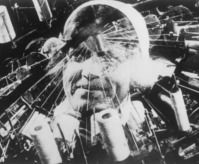Hamptone JFET Wire Type/Brand
- lightandmind
- pushin' record
- Posts: 281
- Joined: Wed Oct 25, 2006 3:19 pm
Hamptone JFET Wire Type/Brand
I can't find my parts list anywhere and desperately need wire up the 22 gauge parallel audio outputs for an upcoming session. Anyone got the Mouser/Digikey part number?
Any wire should work and it doesn't have to be 22 AWG. Do you have a chunk of old mic cable? Strip it down and use the two interior conductors. Just make sure to twist them together. Even a chunk of lamp cord or speaker wire would work in a pinch. Or the interior conductors out of an IEC power cable.
- lightandmind
- pushin' record
- Posts: 281
- Joined: Wed Oct 25, 2006 3:19 pm
Right, (thanks), but I would like to keep either use wire with the same specs of the existing wire on the two audio channels, (number of strands, size of insulation), although I would definitely entertain the prospect of using a superior quality brand/type with specs that will reject the most RF/interference, if you have a suggestion then I would love to hear it.Any wire should work and it doesn't have to be 22 AWG. Do you have a chunk of old mic cable? Strip it down and use the two interior conductors. Just make sure to twist them together. Even a chunk of lamp cord or speaker wire would work in a pinch. Or the interior conductors out of an IEC power cable.
So you have an existing unit already that you're trying to match? You didn't mention that. Are the components matched between them well enough that 8 inches of 24AWG pulled from a mic cable is going to sound different than 8 inches of 22AWG from a spool? We're not talking about signals in the MHz or GHz range, where wire capacitance can start rolling off high-frequency content.lightandmind wrote:Right, (thanks), but I would like to keep either use wire with the same specs of the existing wire on the two audio channels, (number of strands, size of insulation), although I would definitely entertain the prospect of using a superior quality brand/type with specs that will reject the most RF/interference, if you have a suggestion then I would love to hear it.Any wire should work and it doesn't have to be 22 AWG. Do you have a chunk of old mic cable? Strip it down and use the two interior conductors. Just make sure to twist them together. Even a chunk of lamp cord or speaker wire would work in a pinch. Or the interior conductors out of an IEC power cable.
Regardless...
A good choice for hookup wire is the stuff that Apex Jr carries:
http://www.apexjr.com/wire.html
Teflon coated, military spec, silver plated copper.
I also like Consolidated brand wire for general purpose hookup stuff. It's not as stiff as some other brands, like JSC, and the insulation is easier to strip and slightly thicker. AlphaWire is available through mouser and is very similar to the Consolidated stuff. I've used both interchangeably without problems, depending on availability and price.
If the Hamptone parts list called for some hookup wire from mouser, I'm 99% sure it was made by AlphaWire. That's their major supplier.
As for RF or other interference, you could use a shielded twisted pair, rather than unshielded. Ground one end of the shield to create a "Faraday cage" around your conductors. It's usually not necessary inside of a shielded enclosure, but I've seen it solve some problems before.
Who is online
Users browsing this forum: No registered users and 164 guests
